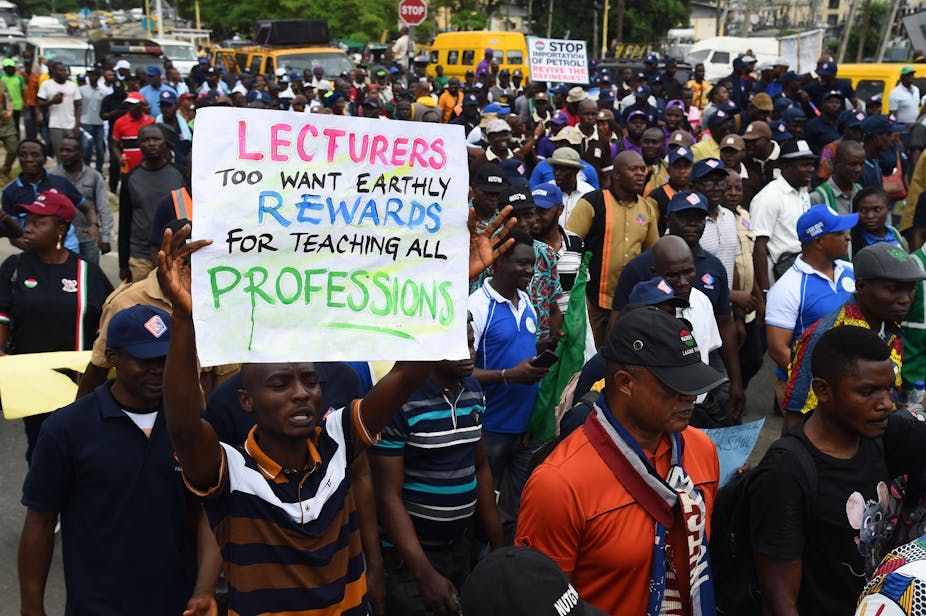Lecturers at Nigeria’s public universities have been on strike 16 times since 1999. On 14 February 2022 they went back on strike to make it the 17th. Only 11 of Nigeria’s 59 state universities haven’t taken part in the current strike action. The Conversation Africa asked Dele Ashiru, a lecturer and member of the national executive council of the Academic Staff Union of Universities, to provide insights.
What’s behind the incessant strike action?
There are so many reasons.
The bottom line is underfunding of the system and the failure of the government to implement an agreement it reached with our union in 2009. Infrastructural, teaching, learning and research facilities are grossly inadequate in our universities. That’s why we, the Academic Staff Union of Universities – the umbrella body for public university lecturers in Nigeria – demanded adequate funding. We reached an agreement but the government has reneged on its implementation.
Tied to this is the issue of salaries. We demanded that universities have autonomy. Instead the government came up with a salary payment system that is alien to the university system anywhere in the world. They come up with a system whereby salaries of lecturers are paid by the accountant general of the federation.
We rejected this because it means every payment – including research grants, sabbatical leave payments and leave allowances – has to pass through the personnel system. This is inefficient, and facilitates corruption.
Besides, our wages are so poor that a very senior professor earns less than US$1,000 per month.
And our students are suffering. A hostel room that is supposed to house just four students will have 12 living in it. Lecture rooms are overcrowded. This is unacceptable.
The underlying problem is the proliferation of universities. Institutions are created for political reasons. We told them during one of our negotiations to stop creation of more universities when existing public universities are underfunded.
Read more: New universities in Nigeria? Absolutely not
The poor working conditions have forced many of our colleagues to seek greener pastures abroad. This leaves the remaining ones with a heavy workload.
But the government is not listening. They set up committees and reports are submitted but are not implemented. The cycle continues.
As lecturers, our interest is in the development of our students and the university system. So long as the government remains adamant, the cycle of strikes will continue.
How have the strikes benefited the universities?
I will say that the first benefit is that public universities are still standing. Otherwise most would have gone into extinction.
Secondly, if it were not for the strikes, some of the interventions to uplift the institutions’ facilities would not have been set up by the government. For instance, our strikes led to the establishment of the Tertiary Education Trust Fund in 2004. This is an agency that provides funding for educational facilities and infrastructural development in tertiary institutions.
It came about after our agitation for infrastructural development on our campuses. Some of the lecture theatres, hostels, libraries and laboratories you find on our campuses now were built by the agency.
Thirdly, our strikes have also brought the challenges facing the university system into the consciousness of Nigerians.
Those in government and rich stakeholders who are supposed to collaborate with us to develop public universities have alternatives for their children. That’s why they are not interested in growing public universities.
Are there other ways you could get your demands met?
The government is the one that always pushes us into taking strike action. If you enter into an agreement, you have to honour it. But that is not in the character of the Nigerian government.
Before the Academic Staff Union of Universities calls a strike, we would have consulted top officials of government to prevail on their bosses to meet our demands. We would have appealed to respected leaders of thought, leadership of religious organisations. Sometimes, we go as far as visiting the president’s chief of staff.
It is after we have exhausted all these avenues that we resort to strike action. I think the only language government understands is strike. It is the frustration visited upon us by the government that forces us to down tools.
What conditions must be met for the strike to be called off?
We have declared this action as indefinite because we want it to be the last time our universities will be shut. The government has options. Most of their children are in good schools abroad while some are in well-funded private universities. But the children of the poor are made to face the consequences of their irresponsible and insensitive actions.
Read more: Nigeria's university strikes: winners, losers and ways forward
That is why we have resolved never to call off the strike until our demands are met. These include:
revitalise the universities with adequate funding
obey the country’s constitution, which says you must provide education for Nigerians
grant autonomy to universities
pay lecturers’ salaries in a transparent and accountable way
stop creating politically motivated universities
pay a living wage to lecturers and improve students’ welfare
provide infrastructural facilities for research, learning and training
implement the agreement with our union.
Once these conditions have been met we will be good to go.
Are you justified in asking that lecturers be paid while on strike?
The excuse the government is advancing for the no-work no-pay rule is that it doesn’t have money. That is not true. The truth is that there is unbridled corruption. And, might I ask, where do they get money to send their children to foreign universities?
Nigeria has the resources to fund university education. It should block leakages in public finance and fund education. A nation cannot develop beyond the level of education it gives its citizens.

